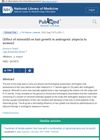TLDR Herbal compounds might help hair growth, but more testing is needed.
This review explores the potential of herbal agents in promoting hair growth by examining bioactive compounds such as flavonoids, alkaloids, phenolics, polyphenols, phenylpropanoids, and saponins. These compounds may aid in hair follicle regeneration and alopecia prevention through mechanisms like prolonging the anagen phase, inhibiting 5-α-reductase, enhancing blood circulation, and providing antioxidant and anti-inflammatory effects. While in vitro and in vivo studies suggest these natural compounds are promising for hair growth, further clinical trials are necessary to confirm their effectiveness.
 March 2025 in “Journal of the American Academy of Dermatology”
March 2025 in “Journal of the American Academy of Dermatology” Systemic minoxidil improves hair density in women with female pattern hair loss over time.
 February 2024 in “Cosmoderma”
February 2024 in “Cosmoderma” Low-dose oral minoxidil can help treat male and female pattern hair loss, especially in those who can't use topical treatments or have heart health issues.
February 2020 in “The Pharmaceutical Society of Japan” 8 citations,
March 2015 in “PubMed” 5% minoxidil foam effectively treats female hair loss.
January 2007 in “Strait Pharmaceutical Journal”  397 citations,
February 2004 in “British Journal of Dermatology”
397 citations,
February 2004 in “British Journal of Dermatology” Minoxidil boosts hair growth by opening potassium channels and increasing cell activity.
 1 citations,
September 2002 in “PubMed”
1 citations,
September 2002 in “PubMed” Minoxidil helps stimulate hair growth and reduce hair loss in women with androgenic alopecia.
 236 citations,
July 2001 in “Trends in Molecular Medicine”
236 citations,
July 2001 in “Trends in Molecular Medicine” Future hair loss treatments should aim to extend hair growth, reactivate resting follicles, reverse shrinkage, and possibly create new follicles, with gene therapy showing promise.
 370 citations,
September 1999 in “The New England Journal of Medicine”
370 citations,
September 1999 in “The New England Journal of Medicine” Finasteride and minoxidil are effective for hair loss, but continued research is needed for better treatments.





